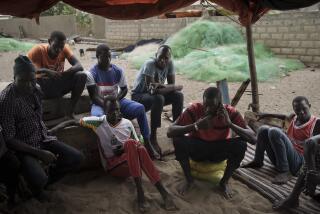Youths’ Plea Galvanizes Europe; Then Life Goes On
- Share via
BRUSSELS, Belgium — The Story So Far
As the airliner lifted from the West African airport and soared into the sky, conditions inside the wheel well went from sub-Saharan heat to Arctic winter in minutes. The two 14-year-old stowaways grew painfully cold, and the thinning air starved their brains of oxygen. Days later and many miles away, a worker at the airport in Brussels found their lifeless bodies. There the story might have ended--just another case of Africans dying in a desperate dash for a better life. Except that something among the boys’ meager possessions caught an investigator’s eye. An envelope whose address began with the words: “In Case We Die . . .”
*
For four days, they were ghosts in the flying machine.
At least three times, they had crisscrossed jungles, the Sahara and Europe before their bodies were discovered in the jetliner’s wheel well. Now Yaguine Koita and Fode Tounkara were in the air again, flying home to the West African nation of Guinea.
But this time the two 14-year-olds were inside the airplane, accompanied by solemn men in solemn suits--their country’s ambassador to Belgium and a representative of the Belgian government. They were being returned home with honors.
All because of the letter.
Ann Fransen, the Brussels deputy prosecutor, had been burning to read it ever since she watched the medical examiner remove it from Yaguine’s clothing. It was late afternoon, hours later, before a copy was faxed to the Palais de Justice and delivered to her by a clerk.
She sat at her desk, where she keeps pictures of her two little girls, and read:
“Excellencies, Messrs. members and officials of Europe.
“We have the honor and pleasure and great confidence in you to write this letter to talk to you of the objective of our journey and the suffering of us, the children and young people of Africa. . . .
“We have war, disease, malnutrition. . . . In Guinea, we have too many schools but a great lack of education and training. Only in private schools can one have a good education and good training, but it takes a great sum of money, and our parents are poor and they have to feed us. Nor do we have sports schools where we can practice football, basketball or tennis.
“That is why we, African children and youth, ask you to create a great, efficient organization for Africa to allow us to progress.
“And if you see that we have sacrificed and risked our lives, it is because there is too much suffering in Africa and we need you to struggle against poverty and put an end to war in Africa. . . .
“Finally, we appeal to you to excuse us very, very much for daring to write this letter to the great personages to whom we owe much respect. . . .
“Written by two Guinean children, Yaguine Koita and Fode Tounkara”
This letter, Fransen immediately decided, must not be buried in a file.
“I’m not that emotional,” she said later, “but it immediately gripped me.”
But how to make it public? There was the long way--going through channels in the law enforcement bureaucracy. And there was the short way--go directly to the investigating judge. Fransen chose the short way.
Publish it, the judge said. And the floodgates opened.
Tragedy Strikes a Nerve in Belgium
Yaguine’s and Fode’s letter was splashed across the continent’s biggest newspapers. Churches and charities campaigning for Africa adopted the boys as symbols. The tragedy struck an especially sensitive nerve in Belgium, where many still feel guilty over their country’s past as a colonial power in Africa--a history of greed and brutality that inspired Joseph Conrad’s novel “Heart of Darkness.”
In Guinea the boys were mourned as national heroes, their bodies received at Conakry’s airport by cabinet ministers. Their parents were comforted by some of the most powerful men in the country. Web sites sprang up all over the Internet commemorating Yaguine and Fode.
The letter reverberated through the United Nations and the International Monetary Fund, and for a while it seemed that the gulf of indifference separating Europe and Africa finally was narrowing.
*
Belgium is about one-ninth the size of Guinea and has slightly more people. “With our limited means we are not able to solve the suffering of the Third World,” says Filip Dewinter, leader of the anti-immigrant Vlaams Blok (Flemish Bloc) party.
The country’s political divide is widening. Like populist parties in Austria and Switzerland, Belgium’s is gaining support with its call to curb immigration.
But Belgium also is about 30 times richer than Guinea, and its new foreign minister, Louis Michel, already had been looking for ways to address Africa’s plight and counter the anti-immigrant camp.
The boys’ letter, he believed, would be the perfect metaphor.
So he made it the theme of his speech Sept. 25 to the U.N. General Assembly, gathered in New York seven weeks after the bodies were found.
They were, Michel told the General Assembly, “victims of their idealism and their innocence who embarked on this reckless voyage to chase the mirage of Western civilization.”
Three days later, Michel Camdessus, then managing director of the International Monetary Fund, opened his address to the Board of Governors by quoting from the letter.
“It tells us that the extent of poverty still present at the end of a century of affluence is intolerable,” Camdessus said. “It is time to respond.”
Officials in Guinea Grow Defensive
The voices of Yaguine Koita and Fode Tounkara had reached the world’s highest forums. But in Guinea, tolerance began to wear thin. As European journalists arrived to follow up the story, Guinean officials grew defensive.
Did the boys even write the letter? Some Guinean officials doubt it. They insist it’s too sophisticated for a 14-year-old. Although the handwriting appears to be Yaguine’s, they say he may have copied it from a letter written by a teacher, an older friend, even an opposition politician trying to discredit Guinea.
But its very artlessness is striking. It is peppered with grammatical errors. It feels like the work of a child trying to sound like an adult--and failing.
The government gave each family $300 and paid for the burials; then officials dropped all contact with them. Yaguine, officials said, had betrayed his nation, embarrassed Guinea before the world.
Guinea has an informal social network and family values to cope with poverty, they said. It wasn’t life in Conakry that killed Fode and Yaguine, they said; it was the false allure of TV images from the West.
“We can’t say that there’s no poverty, but that’s not what is driving the children overseas,” said Ibrahima Camara of the Ministry of Social Affairs, Women and Children. “It’s the mirage.”
Such responses infuriate Bayo Karamba, a Guinean aid worker and children’s advocate. “They are concerned with keeping the army quiet so there isn’t another coup--period,” he said. “They don’t care about the children.”
In the ensuing months, Europe’s cries for change have melted into letdown. The boys’ story faded from front pages. The politicians started talking about other things. Life went on.
Belgium did revive an aid plan for Guinea and forgave about $10 million of Guinea’s $3.3 billion in foreign debt, a droplet in the ocean of financial misery.
“It created hope, but everything is so slow,” sighed Michel, the foreign minister.
“It’s been forgotten,” said Karamba. “By everyone.”
Now the boys’ letter rests inside Dossier No. 46.93.123506/99 of the Belgian state judiciary. And on another continent, in a public cemetery, two graves 10 feet apart mark the end of the journey for two boys who had a message for the world.
The small mounds of dirt in the Conakry graveyard are edged by rocks and rotting chunks of palm trees. Green and purple plants thrive in the dark soil.
Staked to each grave is a small metal marker.
Both are blank.
*
This story was reported in Guinea by AP West Africa Bureau Chief Tim Sullivan and in Belgium by AP Brussels Correspondent Raf Casert.
(BEGIN TEXT OF INFOBOX / INFOGRAPHIC)
On the Net:
https://www.orientation.com. Select “Guinea” in the destinations box and you will be referred to a variety of sites on all aspects of Guinea.
More to Read
Sign up for Essential California
The most important California stories and recommendations in your inbox every morning.
You may occasionally receive promotional content from the Los Angeles Times.













